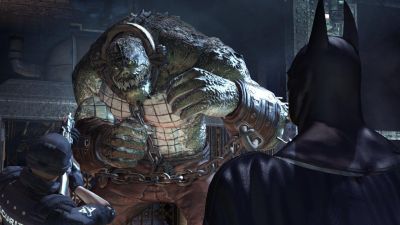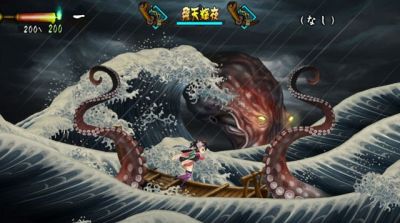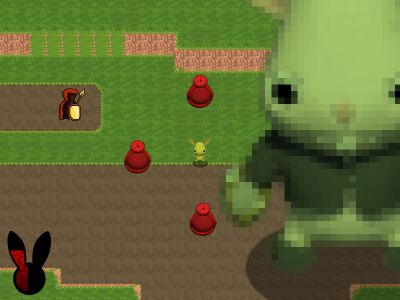Batman Arkham Asylum

There has been a cautious return to the Metroidvania genre lately in the sense that mainstream games borrow more and more elements from it. I definitely approve of this, and while Arkham Asylum could have taken it further it was indeed a very nice way to spend a day.
In addition to the feature-based progression that is the staple of Metroidvanias, the game sports a rather advanced hand-to-hand combat system. When fighting armed opponents by sneaking in from the shadows, taking out an enemy and then sneaking back the game is a true joy to play and perfectly captures the essence of the last two movies. When fighting unarmed enemies it is usually good entertainment but occasionally becomes tedious as enemies are lining up to strike you in the back as you attack someone else.
My main gripe with Arkham Asylum is how disconnected the gameplay elements feel from each other, while the moves you learn during the game can sometimes be used in combat they are normally quite worthless as such and resemble a lock-key mechanic that gives you access to new areas more than character development. The same goes for the exploration and finding new things, while you do get a little experience from it (and a few things that do not matter gameplay-wise) there is little immediate benefit from doing it other than the joy of seeing the game. Nothing particularly wrong with that, I just personally think a more holistic experience could have been better.
But it is indeed a nice title, and I hope it helps set some trends in exploration-based action games.
Muramasa the Demon Blade

Muramasa reminds me of a time where game magazines felt the need to enounciate what a particular score for a game meant (sort of an oddity since the point of having numeric scales is that you should immediately know how well something compares to the gray mass of other somethings), in the sense that you always had the range where a game was generally good but also had a few really tedious parts that left a big stain on the rest of it. Muramasa defines this category as it does the fighting really well and has decent production values (2D games seldom look better), but the time traveling from one part to another is completely uninteresting. I guess, as was the case with Persona 4, that the tedium can serve to further highlight the good parts, but I will have to get back to that thought.
The game was made by Vanillaware, famous for Odin Sphere. Like Odin Sphere it has a rather complex fighting system and soul collecting mechanic for detailed leveling, unlike Odin Sphere it actually has platform game mechanics and a slightly less complex item system. While it still feels like a long trail of enemies between boss fights, the platforming challenges and light exploration at least make it more varied. And like Odin Sphere it looks very pretty – I do not want to discourage artistic experimentation but the classic anime-style art goes much better with the feudal Japan era Muramasa than it did with the western high fantasy Odin Sphere presented.
I liked Muramasa as it did the fighting very well, but as you kind of knew how the rest of the game was going to play after the first 10 minutes and the story consisted of a few short lines of dialogue before boss fights the incentives to keep playing were few. Vanillaware took a step in a direction to make it more varied than Odin Sphere so it will be very interesting to see if they keep doing this with their next game, although it would be interesting to see if they can improve the fighting even further as well.
Chris Hecker on gamejams
Reaching a similar (although more thought-through and well put) conclusion about game jams as I ranted about after GGJ a few weeks back, industry veteran Chris Hecker ranted on GDC about the importance of following through on good ideas and how the gamejam mindset might be dangerous to that. Jonathan Blow among others comments on this as well. Although the rant itself is a bit more nuanced than “don’t do games quickly”, I wonder if we will see a community backlash against the concept of rapid prototyping. That would indeed be interesting.
Rapid prototyping evolved as a way of trying out concepts quickly before committing a lot of time to them, with the idea that once a solid concept was found you were supposed to put more time into it. The same “throwing everything at the wall and see what sticks” idea common in other creative industries. I do not think Hecker has any issues with this, rather the culture that has evolved around it where the prototypes are the goal and not a step on the way… And I do agree that this is becoming a problem, though I mentioned that in my own rant so I will not go over it again. There are a lot of talks and presentations on how to go about rapid prototyping and making the most of your time, maybe there should be more about recognizing good concepts, where to go when you have them and something about the dangers of losing yourself in endless small projects. On the other hand, making games quickly is becoming sort of a hobby in itself, a sport to occupy yourself with, and maybe it should just be separated from “normal” games development and treated for what it is.
On a final note, I do not worry too much about the fixation on sticking to schedule being a problem in the mainstream games industry, important people have assured me that a willingness to recognize opportunities and make the most out of a project even when it means changing the plans is much more desirable in a developer than a willingness to stick to the schedule. In other words, projects that are poor would usually have been poor even with a few more months development time -had they been scrapped and recreated from the bottom up a difference might have been made, but it is questionable if such a rewrite could really be called the same game. For small to medium-sized productions this might be an issue but for larger projects the marketing budget will easily rival and more often than not exceed the production budget, so it is often cheaper to cancel or delay a poor game than to release it prematurely to poor sales.
Mass Effect 2

… I actually completed Mass Effect 2 a few weeks ago, but following that I started up a new character and played through it again. Like Mass Effect it is very immersive and responds to how you play the character, and I felt that I needed to choose the other moral path offered by the game and see if it was just because I played the game as intended or if it was indeed that good. It was, but knowing what parts where changed and what were not made some of it feel patched together.
So, Mass Effect 2 is a good game. A great game even, an improvement over an already solid first iteration. The classes and abilities have been more clearly defined, the equipment and item system have been trimmed down to something more suitable to the game and the seemingly auto-generated planetside segments have been removed in favor of a large number of solid sidequests with proper level design. The story and the presentation of it feels even tighter now than it did in Mass Effect, and the characters feel more rounded and likable.
Nothing is really horrible with the game (I did not mind the mining so much as others seem to, but then I did that while I was eating), but there is still ways to go with the battle system. It has improved since Mass Effect to be sure, and considering the multitude of ways you can play the game it does the 3rd-person cover-based shooting game fairly well. Doing everything seldom means doing anything particularly good, though, and the AI rarely do what you tell them, the cover system often means your character jumps in and out of cover without being told and being shot in the process and there is a sluggishness to the movement. Also, the game has the same rendering issues found in Mass Effect as well as a bunch of physics issues, getting stuck in terrain is not at all uncommon.
But you get the feeling Bioware was aware of this not being the core of the game and made the battles suitably lenient. The game is very well-designed and immensely enjoyable, and considering the game with the best cover-based combat I have seen was Gears of War maybe asking for an improvement in that area is risky.
A Jam and a Rant

Another iteration of Gotland Game Jam, this time I worked with artists Zenobia Homan and Jona Marklund to create the game Masquerade [download win32]
The theme of the jam was “the Play” and Masquerade is a top-down brawler where the participants are actors on a stage using costumes lying around to act out the roles of different kinds of warriors. In all honesty, this is design-wise not very different from simply picking up new weapons, but as we all wanted to make something complete innovation took a backseat to playability. It was a while since I last made a top-down brawler but what was really new for me was the basic AI of enemies with quickly changing abilities, luckily I did not need to worry about art so I had plenty of time to get it to a functional level. The end result is nothing spectacular, but a decent diversion if I may say so myself.
Some friends and acquaintances I have in the indie scene have told me that they usually do not go to these kinds of events to create games anymore, rather they just try to have a good time and meet people. I am starting to see why – not that I do not like making short games under pressure, but the tradeoffs you make are starting to become apparent. First of all, making a game in 40 hours can be a very demanding experience that you really have to prepare for and plan around, and fun as it is there are more enjoyable and productive things to spend your time on once you have done it a few times.
But also, there is some limit to what you can accomplish. I know a lot of people are championing rapid prototyping and I do not argue that it is a good way to create good games, I just do not think it is the only way. You can create great core mechanics in a short time, but for some ideas the greatness lies in the scope. The thing separating a great game from a poor one might be production values or long iteration times as well as a great core mechanic, and I think that by being short-sighted you can loose a lot of great ideas. Alec Holowka touched upon this awhile ago. I do not really buy into the whole “If a game idea is not fun after the first two hours of prototyping it needs to be scrapped” – mindset, it reminds me of the larger games industry, the impatient industry where books are written about the concept of the “elevator”-pitch.
In short, I think the amount of time we spend on being quick is staggering and it thus misses the point. Whether we are pitching a game to a publisher or trying to sell our own image as developers to the indie crowd I think the entire game development world could benefit from more wanting to create good games and less wanting everybody to know about them immediately.
… But then again, I guess there are a lot of people who are developing good games anonymously – we just do not see them.